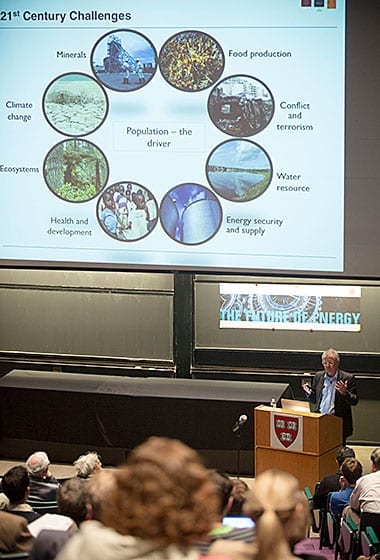
Expert says problem isn’t just population, it’s lifestyle
Our most pressing environmental challenge is not how many people the planet can support, but rather how many cellphone-toting, satellite-TV-watching, gas-guzzler driving members of the middle class it can bear.
That was the message from Sir David King, former science adviser to the British government, chancellor of the University of Liverpool, and director of research in physical chemistry at the University of Cambridge, who spoke at Harvard’s Science Center on April 17.
While global population growth has been important over the last century, as the number of humans climbed from 1.5 billion in 1900 to some 7 billion today, average female fertility has declined to the replacement value of 2.1 births, King said. While a significant increase of some 2 billion people is still expected as today’s children reach childbearing age, lifestyle changes are the greater challenge, he said.
The global middle class — defined as those who spend between $10 and $100 per day — has climbed rapidly, reaching 1 billion in 2000 and doubling to 2 billion just recently. The middle class is expected to reach 4.8 billion by 2050, raising the question of whether the planet has the resources to deliver the lifestyle people will expect.
“Improving Human Well-Being on a Resource-Limited Planet: Can We Do It?” was sponsored by the Harvard University Center for the Environment and was part of its “Future of Energy” lecture series. King was introduced by the center’s director, Daniel Schrag, Sturgis Hooper Professor of Geology and a professor of environmental science and engineering.
There are already signs the growing middle class is prompting increased competition for resources in global markets for oil, food, and minerals, King said. Fresh water sources are strained, including both surface water and aquifers. Some water-poor nations have turned to desalinating seawater, an energy-intensive process, with the energy often provided by coal.
King pointed to continued high commodity prices during the global economic downturn as evidence that global capacity is being strained. During the Great Depression, commodity prices collapsed as economic activity in industrialized nations declined; cheap commodity prices then helped fuel the economic recovery, King said.
In the most recent recession, commodity prices have stayed high, likely as a result of increased demand from the growing global middle class, largely in Asia and the Pacific, but increasingly in Africa as well, he said.
Oil prices’ response to supply and demand appears to have changed since 2005, King said. Prices spiked to $140 a barrel and have remained high despite the economic downturn, another sign of increased global demand. High oil prices have hurt the economies of Italy and Greece, he said, and are threatening Britain as its North Sea oil production declines.
The direct cost of imported oil in the United States, he said, is $1 trillion a year, but there are indirect costs — like the trillions spent on the Iraq War — that can be attributed to the need to maintain oil supplies.
“The impact of oil is massive,” King said. “The question is whether the economies of the world can operate at this price, $100 a barrel.”
The Latest Bing News on:
Impact of the middle class
- 2024 NFL draft questions: Which teams made instant-impact picks?on May 8, 2024 at 3:10 am
T he 2024 NFL draft brought record-breaking trends, including six quarterbacks picked in Round 1 for the first time since 1983 and eight offensive tackles taken in Round 1, which ties 2008 for the ...
- What Is the Middle Class? Income and Rangeon May 6, 2024 at 4:59 pm
There is no single definition for the middle class that exists, but it's often considered between 67% and 200% the median income. The term "middle class" is often thrown around by politicians and ...
- Biden Tax Increases Won’t Hit Middle Class, Yellen Sayson April 30, 2024 at 12:21 pm
Republicans pressed the Treasury secretary on President Biden’s tax proposals and the fate of the Trump tax cuts that will expire in 2025.
- Cowboys need instant impact from NFL draft picks after last year's rookie class floppedon April 25, 2024 at 11:57 am
The Cowboys have had a strong NFL draft track record in recent years, but last year's rookies severely underwhelmed as a group.
- The BJP manifesto's focus on the middle-class will have far-reaching impacton April 15, 2024 at 5:00 pm
Recognising the importance of a thriving middle class to India's world-beating economic growth, the Bharatiya Janata Party (BJP) has—in its election manifesto—promised several measures that ...
- 15 Struggles the Middle Class Just Can’t Escapeon April 8, 2024 at 8:45 am
The middle class often faces unique challenges that can impact their financial stability, well-being, and quality of life. These struggles can affect daily life for middle-class individuals and ...
- Are We Headed For A ‘Richcession?’ Why The Wealthy Stand To Lose The Most If The Economy Stallson January 8, 2023 at 8:46 am
Recessions generally have an outsized impact on working and middle-class workers. The tight job market could protect lower-wage employees from potential layoffs during a recession. The wealthy ...
- Where Do I Fall in the American Economic Class System?on January 13, 2022 at 3:36 am
Middle-class income currently ranges from a little ... Time will tell how recent events impact the way Americans view their economic class rankings in the years to come. In general, much of ...
- why the middle class can never become rich?on December 31, 2021 at 7:22 pm
Essentially, wealthier people are not happier than their middle class counterparts. Housing, food, and health care are available to both groups. If our basic needs are met, we reach a plateau in our ...
- why middle class ca not become rich in usa?on November 22, 2021 at 12:24 am
If we use the American Community Survey data to define middle class, then all households with incomes between $35,000 and $125,000 would fall into that category. A state of mind is more important than ...
The Latest Google Headlines on:
Impact of the middle class
[google_news title=”” keyword=”impact of the middle class” num_posts=”10″ blurb_length=”0″ show_thumb=”left”] [/vc_column_text]The Latest Bing News on:
Growing middle class
- Global retirement gap to reach unprecedented highs – Swiss Reon May 7, 2024 at 7:13 am
Jonathan Graham, head of financial markets and in force management at Swiss Re, has highlighted the growing challenge of the retirement savings gap, emphasizing the life insurance industry’s potential ...
- Upper Middle Class: 20 Signs You've Made It, and How to Get Thereon May 7, 2024 at 7:05 am
The upper middle class has emerged as an increasingly influential segment of society, with its size and economic clout expanding significantly. According to a report titled “The Growing Size and ...
- I hate having to repeat myselfon May 7, 2024 at 3:00 am
Governor, I can open up employment for them in the Civil Service, but our people in the private sector are not ready for that” — Sir Henry Tucker (as related by Calvin Smith, former senator and ...
- China’s middle class is stressed. Can its growing mental health industry lend a helping hand?on May 7, 2024 at 1:41 am
Numerous stressors are causing China’s middle class to seek professional help, leading to rapid growth in the mental health industry – but will that be enough to soothe their nerves?
- Author Lawrence McDonald Chats With "Motley Fool Money"on May 6, 2024 at 3:15 pm
The topics include what an aging American population means for stocks and how natural gas companies benefit from a growing global middle class.
- 30 Cities Where Paychecks Are Shrinking — And Growing — The Fasteston May 6, 2024 at 7:56 am
Roughly half of all Americans live in the middle class, according to a 2021 study by the Pew Research Center, yet even the middle class has significantly shrunk -- around 11% since 1971. And while ...
- The Future Of Entrepreneurship In Indiaon May 6, 2024 at 6:43 am
It’s entirely cashless.” Estimates of the middle class in India range from 350 million people to nearly 500 million. So far. About a decade ago, the government launched a comprehensive digital ...
- Growing online enrolments, rising tuition fee to drive revenue for education sector: Ind-Raon May 6, 2024 at 1:19 am
India Ratings and Research Ind-Ra has maintained an improving outlook for the education sector for the financial year 2024-25 driven mainly by continuously g ...
- I was told if I wanted to be a psychologist I should shut up about growing up on a council estateon May 3, 2024 at 7:09 am
When I went to do my PhD to become a psychologist, I was faced with classism for the first time, writes Dr Jessica Taylor – I had never mixed with middle class people, before ...
- How the Upper Middle Class Approaches Investingon May 2, 2024 at 9:00 am
Investing is key to protecting and growing wealth, which is why every financial advisor swears by it. So, no matter what income tier you fall in, you need to be investing as aggressively as you ...
The Latest Google Headlines on:
Growing middle class
[google_news title=”” keyword=”growing middle class” num_posts=”10″ blurb_length=”0″ show_thumb=”left”]









